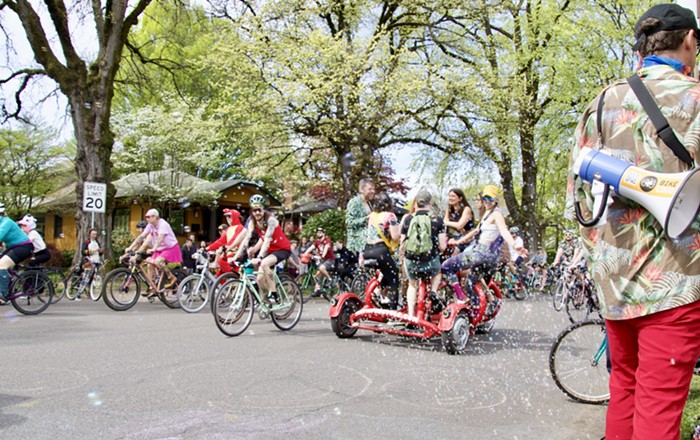Big news in the bike world: today the Bicycle Transportation Alliance (BTA) announced it will finally have a new executive director, after a four month absence at the helm after Scott Bricker was fired. The group snagged Rob Sadowsky away from Chicago’s Active Transportation Alliance. Sadowsky plans to pick up his wife (who has a background in affordable housing) and two teenage kids and head westward ho for the city of plentiful mountains and food co-ops. His top priority at the BTA, he says, will be drafting a 20 year strategic plan for the organization. “We’re going to get our house in order and build a movement throughout the city and state.” I talked with Sadowsky on the phone this afternoon after he had biked home from work.
The first surprise: he's a reformed roller blader.
When did you first start riding a bike?
The first time I can remember riding a bike when I was six, is that what you mean? I rode a bike in high school, I rode a bike in college. And then when I got to Chicago, I stopped riding. Actually, I rollerbladed. This was 1989, 1990. Don’t worry, I didn’t wear, like, a headband, I rollerbladed for transportation, not recreation. In 1998, I got a job downtown and my friend said, ‘You have to ride a bike.’ And I said, ‘No way.’ But I tried it and I liked it, so I went to biking not at all to almost five days a week. It took me a while to start biking in winter, that’s a commitment in Chicago.
In what ways is Chicago doing things better than Portland for bikes?
In the last couple years, Portland has blossomed in a way that kind of puts us to shame. But we still have a central bicycle station, which is something that Portland lacks. It’s a facility downtown where you can lock your bike all day and take a shower. Three hundred bikes fit there, it’s been sold out for four years.
We do a lot more contract work than the BTA, contract work is 40 percent of our budget consulting with the city of Chicago [contracts make up 30 percent of the BTA’s budget]. We consult on installing bicycle racks and facilities as well as running bicycling education programs. We do over $1 million in consulting work a year.
Also, we have some new streets programs, laying out how streets are designed and integrated. Engineers are now for the first time not just designing for cars, but designing roads for all users, from vulnerable users to freight. We’re seeing a lot more pedestrian facilities, bulb outs, crosswalk countdown timers as well as bike lanes.
Under your direction, Active Transportation changed from being a bike advocacy organization to being for bikes, pedestrians and transit. Is that the direction you see the BTA going, too?
Not necessarily. There were strong reasons why at expanded Active Transportation’s mission. That had to do with not having strong transit and ped advocacy organizations in Chicago, as well as funding opportunities. The board [at the BTA] has strongly embraced continuing to be primarily a bicycling organization, but as we move forward in the future we’ll keep our eyes open.
How will you work to win more funding for bikes in Portland?
It’s been funny watching this bike plan funding thing play out in Portland. Generally most roads of any kind have a 20 percent local match and an 80 percent state or federal match. So when you put a pricetag of, say, $600 million on the bike plan, there’s almost an assumption that only $160,000 will come from the city coffers. So I think that’s actually a really strong commitment on the city of Portland to put up that $20 million. I have never seen another municipality step up to the plate like that.
What’s it like biking in Portland versus Chicago?
Biking in Chicago is great. We don’t have any buffered bike lanes, no bike boxes or any dedicated lanes, so it was an exciting thing to ride in those [in Portland]. I’ve only had the opportunity to ride those kinds of facilities when I was in Europe or Montreal. Riding a bicycle is one of my favorite ways to explore a city. It makes a city seem small.
Chicago’s known for its corrupt politics. Are you going to bring some of that here, you know, to get things done?
I am excited to move into a place where government has a sense of transparency and openness. I’ve had one mayor for the entire time I’ve lived in Chicago. I know how to play the inside game, I know how to go directly to a mayor or council member and make the hard ask. But I’m not willing to do it in any way that’s unethical, I won’t bring that lesson from Chicago. Having a benevolent dictator, which is how I would describe Mayor Daley, only goes so far.
Why are you leaving the city?
There are no mountains in Chicago. We have a great lake, but it’s not the same as the Pacific Ocean. We have only one food co-op in the city. Both my wife and I have family on the West Coast. There are a lot of reasons to move to Portland.
What are you excited about in Portland that doesn’t have to do with bikes?
I’m excited for the Farmer’s Market. I’m excited for a sense of progressiveness that people are not afraid of.
For more on Rob and the change-up at the BTA, Jonathan Maus at BikePortland asked the new ED a set of entirely different questions.













